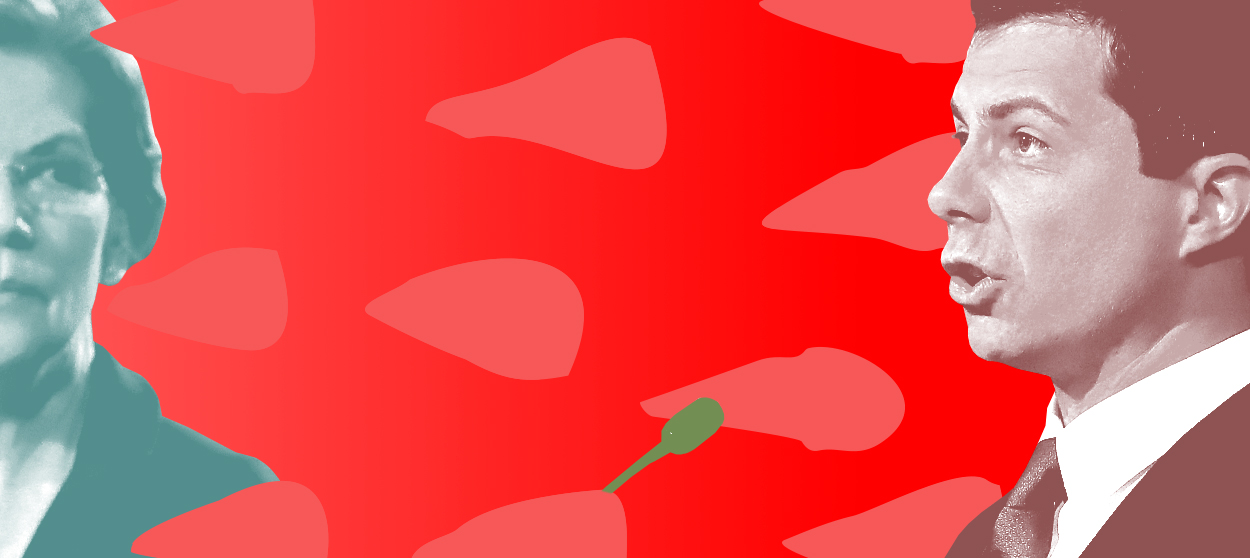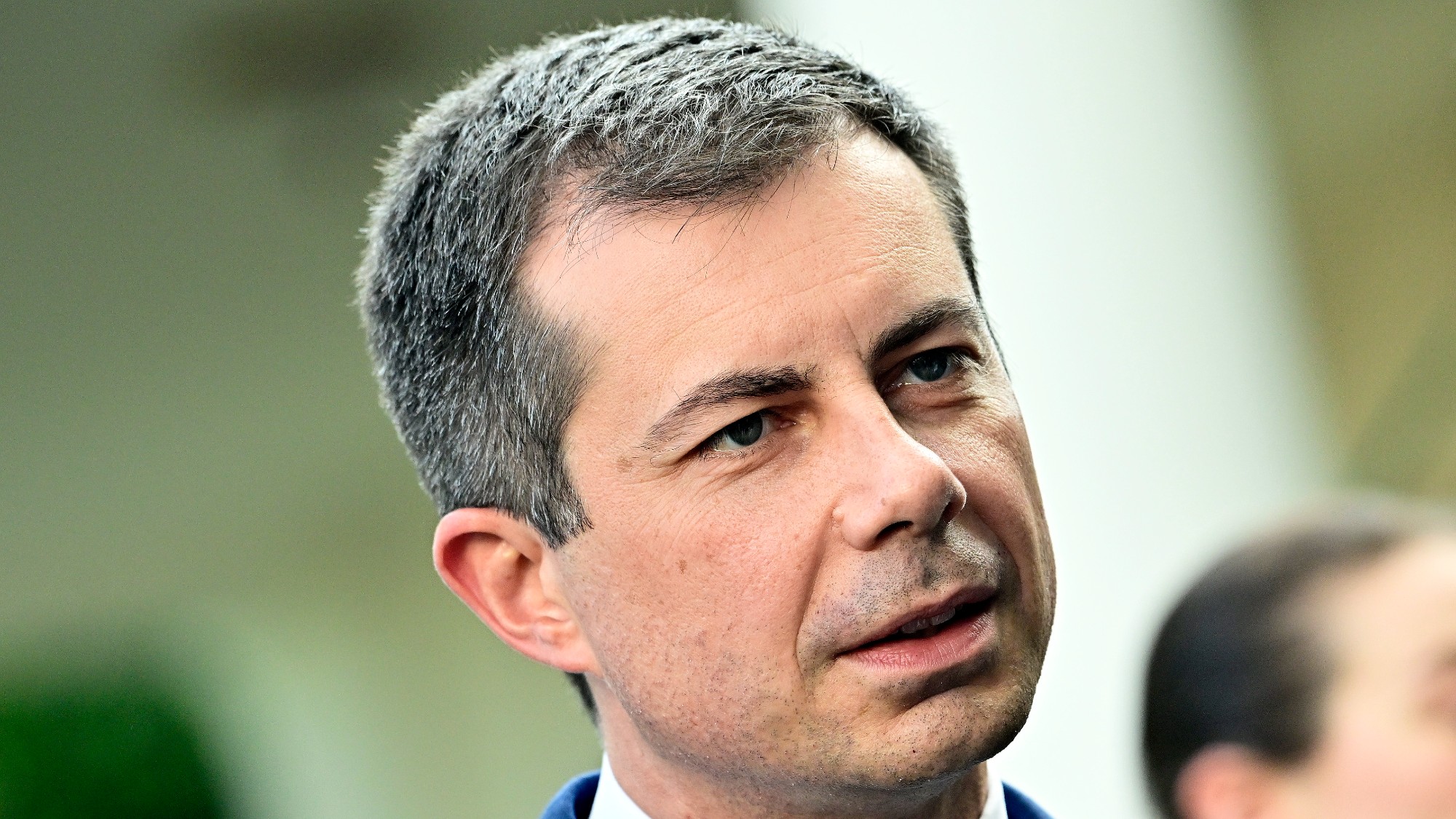Pete Buttigieg's disingenuous attack on Medicare-for-all
The mayor went after Elizabeth Warren hard in Tuesday's debate. There was just one problem.


A free daily email with the biggest news stories of the day – and the best features from TheWeek.com
You are now subscribed
Your newsletter sign-up was successful
In the Democratic presidential debate Tuesday night, once again Medicare-for-all was a major focus of discussion. Once again, Bernie Sanders and Elizabeth Warren defended the plan against all comers — most especially Pete Buttigieg, who had a number of slick arguments about how universal Medicare would be a disaster.
There's just one problem: None of Mayor Pete's arguments are true.
Buttigieg leveled two main attacks. First, along with the moderators, he pressed Warren to admit that she would raise taxes on the middle class to pay for her Medicare-for-all plan. After the New York Times' Mark Lacey asked her if she should "acknowledge" she would raise taxes, she partly dodged the question, saying: "So the way I see this, it is about what kinds of costs middle-class families are going to face. So let me be clear on this. Costs will go up for the wealthy. They will go up for big corporations. And for middle-class families, they will go down."
The Week
Escape your echo chamber. Get the facts behind the news, plus analysis from multiple perspectives.

Sign up for The Week's Free Newsletters
From our morning news briefing to a weekly Good News Newsletter, get the best of The Week delivered directly to your inbox.
From our morning news briefing to a weekly Good News Newsletter, get the best of The Week delivered directly to your inbox.
Buttigieg pounced: "Well, we heard it tonight, a yes or no question that didn't get a yes or no answer. Look, this is why people here in the Midwest are so frustrated with Washington in general and Capitol Hill in particular."
It's very obvious why Warren refuses to say this outright, and it is arguably more accurate for her to do so. In the hegemonic neoliberal framework of American political rhetoric, taxes are always a net cost by definition — something that is taken from the American citizenry and spent on government boondoggles or welfare for poor people. Warren doesn't want to hand Donald Trump any attack lines about how she will raise taxes by focusing on what matters — namely, net costs for average people.
And as HuffPost's Arthur Delaney notes, Medicare-for-all critics are leveraging this framework.
The tax question is a trap, premised on the idea that raising taxes is always bad politics. The moderator already knows the candidate's position. Both the moderator and the candidate believe that answering with a simple “yes” would launch a thousand Republican attack ads. Not answering doesn't work either. After the September debate, TV analysts and the Republican National Committee bashed Warren for not disavowing taxes and not embracing them. [HuffPost]
What really matters here is that, while Medicare-for-all would require some additional taxes on the middle class, those increases would be more than compensated for by zeroing out premiums, co-pays, and deductibles. As economist Gabriel Zucman explains:
A free daily email with the biggest news stories of the day – and the best features from TheWeek.com
Now, one could take a different view on the best way to respond to this type of question. Bernie Sanders forthrightly admits that Medicare-for-all would require some additional taxation on the average citizen, but that would be more than compensated by reduced cost: "Under the Medicare-for-all bill that I wrote, premiums are gone. Co-payments are gone. Deductibles are gone. All out-of-pocket expenses are gone … the overwhelming majority of people will save money on their health care bills. But I do think it is appropriate to acknowledge that taxes will go up."
Second, Buttigieg claimed that Medicare-for-all would cost trillions: "No plan has been laid out to explain how a multi-trillion-dollar hole in this Medicare-for-all plan that Senator Warren is putting forward is supposed to get filled in." On the specifics, Buttigieg is wrong — actually, the Sanders Medicare bill (which Warren supports) has a lot of funding mechanisms outlined.
But on a deeper level, Buttigeig's argument is even more deceptive. He was likely referencing the study from the libertarian Mercatus Center about how much additional tax revenue would be needed to finance Medicare-for-all — just over $30 trillion, as Joe Biden said later. What that figure leaves out is that total health care spending under universal Medicare would go down by some $2 trillion over a decade.
And what it further leaves out is that the Mercatus Center is a hack propaganda shop whose work is heavily biased against progressive policy. As I have previously explained in detail, what Medicare-for-all would cost depends entirely on how much policymakers want to crack down on waste and fraud, and squeeze down the prices of providers. Indeed, we could have universal Medicare without a dime in additional taxes if we crushed prices down to Canadian levels.
These savings would come from eliminating duplicative administration and the price-setting power over providers that universal Medicare would provide. Those savings would necessarily be less in more fragmented systems which would preserve private insurance — like the one proposed by Pete Buttigeig. In other words, Mayor Pete's plan would be more expensive than Medicare-for-all. He would "pay for that" by keeping more of the cost burden on the shoulders of individual Americans.
I, for one, have had quite enough of Buttigieg's glib turbo-wonk shtick. He simply is not being straight with the American people.
Want more essential commentary and analysis like this delivered straight to your inbox? Sign up for The Week's "Today's best articles" newsletter here.
Ryan Cooper is a national correspondent at TheWeek.com. His work has appeared in the Washington Monthly, The New Republic, and the Washington Post.
-
 How the FCC’s ‘equal time’ rule works
How the FCC’s ‘equal time’ rule worksIn the Spotlight The law is at the heart of the Colbert-CBS conflict
-
 What is the endgame in the DHS shutdown?
What is the endgame in the DHS shutdown?Today’s Big Question Democrats want to rein in ICE’s immigration crackdown
-
 ‘Poor time management isn’t just an inconvenience’
‘Poor time management isn’t just an inconvenience’Instant Opinion Opinion, comment and editorials of the day
-
 The billionaires’ wealth tax: a catastrophe for California?
The billionaires’ wealth tax: a catastrophe for California?Talking Point Peter Thiel and Larry Page preparing to change state residency
-
 Bari Weiss’ ‘60 Minutes’ scandal is about more than one report
Bari Weiss’ ‘60 Minutes’ scandal is about more than one reportIN THE SPOTLIGHT By blocking an approved segment on a controversial prison holding US deportees in El Salvador, the editor-in-chief of CBS News has become the main story
-
 Has Zohran Mamdani shown the Democrats how to win again?
Has Zohran Mamdani shown the Democrats how to win again?Today’s Big Question New York City mayoral election touted as victory for left-wing populists but moderate centrist wins elsewhere present more complex path for Democratic Party
-
 Millions turn out for anti-Trump ‘No Kings’ rallies
Millions turn out for anti-Trump ‘No Kings’ ralliesSpeed Read An estimated 7 million people participated, 2 million more than at the first ‘No Kings’ protest in June
-
 Ghislaine Maxwell: angling for a Trump pardon
Ghislaine Maxwell: angling for a Trump pardonTalking Point Convicted sex trafficker's testimony could shed new light on president's links to Jeffrey Epstein
-
 The last words and final moments of 40 presidents
The last words and final moments of 40 presidentsThe Explainer Some are eloquent quotes worthy of the holders of the highest office in the nation, and others... aren't
-
 13 potential 2028 presidential candidates for both major parties
13 potential 2028 presidential candidates for both major partiesIn Depth A rare open primary for both parties has a large number of people considering a run for president
-
 The JFK files: the truth at last?
The JFK files: the truth at last?In The Spotlight More than 64,000 previously classified documents relating the 1963 assassination of John F. Kennedy have been released by the Trump administration
